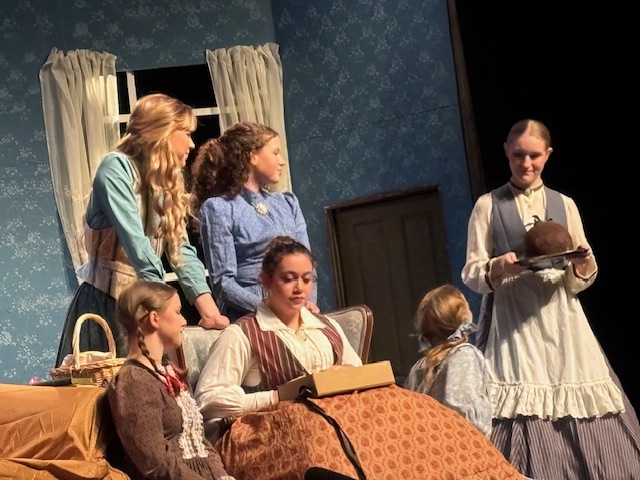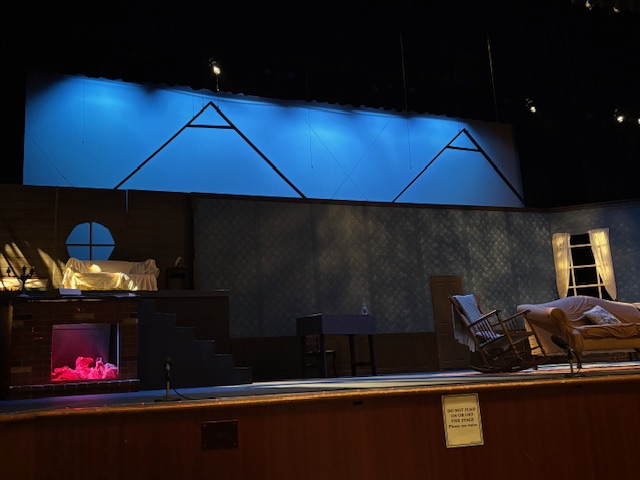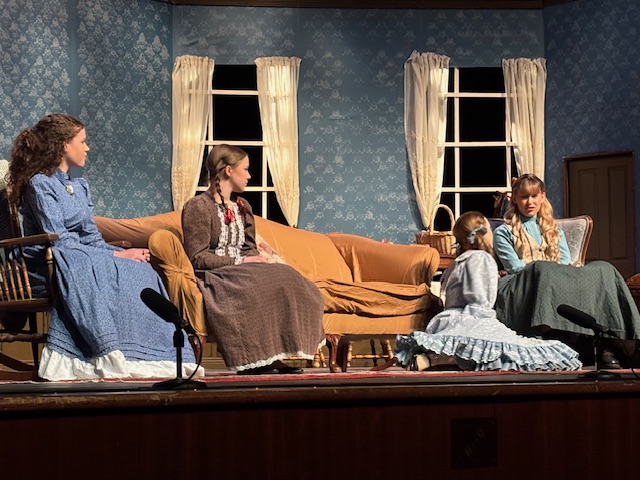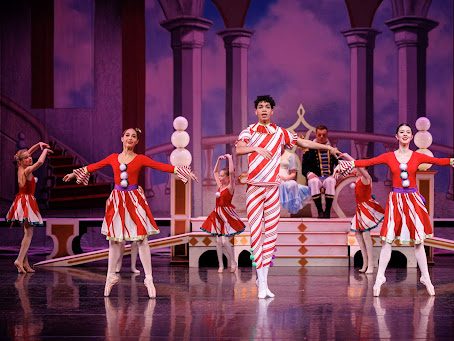The Saline High School Drama Club kicked off their 2025-26 theatrical season with the classic Louisa May Alcott novel Little Women, adapted to the stage by Marisha Chamberlain. Little Women was originally published in two volumes in 1868 & 1869. It made its Broadway debut in 1912.
Saline High School graduate Alyssa Dawson made her directorial debut on the main stage in the Ellen A. Ewing Performing Arts Center at the high school. “Being able to direct a classic play like Little Women on the main stage here is a dream come true,” Dawson said before opening night performance Friday evening. “I am so proud of the hard work by all the actors in really getting into the message of this play.”
Little Women is a story about the March family, four sisters living in 1860 America. Jo March, played by junior Ella Lorenz; Meg, portrayed by sophomore Carmen Harnish; Amy, by senior Katelyn Gray and Beth played by freshman Miren Hartley-Beane. The four actresses gave the audience a peek into 1860 life as the nation is on the precipice of the civil war.
There is an inherent challenge for young actors to portray roles that demand a wide range of thoughts and emotions when most young people don’t possess the lived experiences from which they can draw insights and motivations. Little Women touches on love, loss, the conflicting complexities of family dynamics, while living with the uncertainty of being poor.
The other challenge for this cast is that their experience today is so different than the March girls. Women today can boldly claim they have no intention of marrying; to want to be a writer and publish their works and look forward to leaving their mark on the world. But in the 1860s, women’s roles were prescribed. Marry young, have babies, take care of your man and home and keep everyone happy and healthy. There was no expectation that women would do anything outside of their home.
Lorenz’s portrayal of Jo was that of a modern-day renaissance woman. A prolific writer with a vivid imagination. She wrote plays and kept a daily journal of thoughts and ideas. Her journal became an existential part of herself. Gray played sister Amy to perfection. Her character was likeable. And at the same time, she was a snot-nosed brat. In a fit of jealous rage, Gray ends Act I by throwing Jo’s journal into the fire, sending Jo’s dreams up in smoke.
Little Women mirrors life in the 1860s and 2025. It has family conflicts. It has heart-breaking loss. Frustrations arising from selfishness. And you see the push-pull inherent in young love.
Lorenz provides an impressive performance dealing with her conflict between the promise made upon the Beth’s death bed (played by freshman Miren Hartley-Beane) and her heart’s true desires. Harnish plays an understated Meg, prim and proper, while falling deeply in love.
Hartley-Beane did not have many lines yet her presence was felt. Saying goodbye to Jo while taking her last breaths was a rare example of saying so little while packing a very emotional punch. Every scene Hartley-Beane was in was sensational.

(On sofa) Miren Hartley-Beane & Christina Nollar; (Behind sofa) Ella Lorenz & Carmen Harnish; (On floor) Katelyn Gray) & Aurora Gust: Photo by Steve Sheldon
Each character added to the complexity of the performance. Junior Christina Nollar played Marmee, mother of the girls. She was believable and exemplified the woman of the house in 1860. TV’s Brady Bunch had Alice while the March family had Hannah, played by sophomore Aurora Gust.
The cast is rounded out with senior Holly Peavler as Theodore “Laurie” “Teddy” Laurence who finally admits his affection for Jo who summarily rejects him. Senior William Wilson plays Old Man Mr. Laurence, junior Matteo Migneco is Mr. Brooke, and senior Jamie Meyers plays the March father.
Junior Anna Palacious portrays Aunt March, the 1860 version of “It’s A Wonderful Life’s” Mr. Potter. Wealthy, cranky and judgmental, Palacious is delightful as the obnoxious Aunt March. In a funny moment, as Palacious was exiting the stage, a kid sitting in the audience was heard by everyone saying “she was a badass.”
Collin Wagner’s set design works perfectly to stage this show. It is not elegant but reminiscent of the times. His lighting design neither added to nor detracted from the scenes. It lit the stage so that everyone could be seen, all the time.

Little Women set: Photo by Steve Sheldon
If there is one criticism of this show it would be the sound. For non-musical performances, sound is provided through six microphones, placed downstage. That was adequate when the actors were facing the audience, however, whenever they weren’t, it was difficult hearing the lines.
True to herself, Louisa May Alcott never married. She said she considered freedom a more reliable husband. According to literary critic Sarah Elbert, Alcott used the phrase “little women” to draw upon its Dickensian meaning; “it represented the period in a young woman’s life where childhood and elder childhood are overlapping with young womanhood. Each of the March sister heroines has a harrowing experience that alerts them and the reader that ‘childhood innocence’ is of the past and that the inescapable woman problem is all that remains.”
Little Women runs through Sunday, 11/16. Tickets can be purchased at the door.



 8123 Main St Suite 200 Dexter, MI 48130
8123 Main St Suite 200 Dexter, MI 48130

